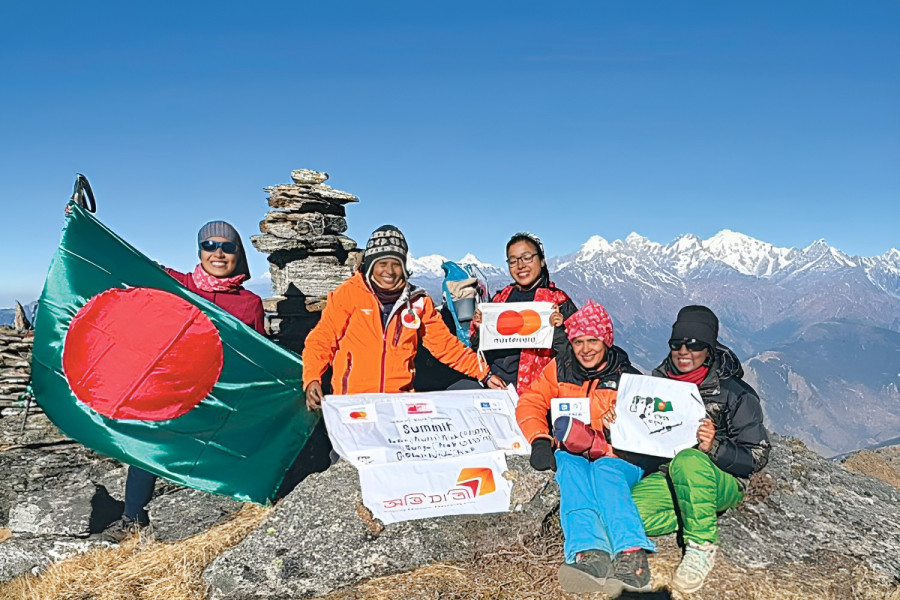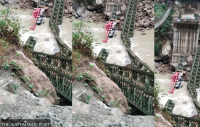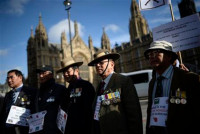National
First-ever Bangladeshi all-women winter expedition to Nepal concludes
The team braved severe winter conditions to scale three peaks—Yala Peak, Surya Peak, and Gosaikunda Peak.
Post Report
The first-ever Bangladeshi all-women winter expedition to Nepal’s Langtang region concluded on January 11, in what is seen as an achievement for gender equality in adventure sports.
The team, comprising five Bangladeshi women mountaineers, braved severe winter conditions to scale three peaks—Yala Peak, Surya Peak, and Gosaikunda Peak—under the banner ‘Sultana’s Dream Unbound’.
A press meet celebrating their accomplishment was held on Monday in Putalisadak, Kathmandu.
According to the organisers, the expedition was inspired by ‘Sultana’s Dream’ (1905), a seminal text of Bengali feminist literature written by Rokeya Sakhawat Hossain which envisions a utopian ‘Ladyland’ where women lead innovations in science and education.
For the expeditors, the work, recognised in UNESCO’s ‘Memory of the World Regional Register for Asia-Pacific’, served as the symbolic foundation for their mission towards empowerment of Bangladeshi women in breaking societal barriers.
Led by Nishat Mazumder, the first Bangladeshi woman to summit Mount Everest, the team included Yasim Lisa, Arpita Debnath, Mousumi Akthar Ap, and Tahura Sultana Rekha.
Their original goal was to summit Yala Peak (5,500m), Baden Powell Peak (5,857m), and Naya Kanga (5,844m). While they successfully scaled Yala Peak as planned, dangerous winter conditions, including icy crevasses and unstable snow, forced the team to abandon plans to summit Baden Powell Peak and Naya Kanga.
“We set up a base camp at 4,600 metres [at Baden Powell peak] and opened the route to 5,400 metres, but crevasses made it impossible to continue,” Mazumder said. “Rather than give up, we adapted and set a new goal to climb three peaks in total.”
Descending to 2,000 metres, the team regrouped and later sumitted Surya Peak (5,145m) and Gosaikunda Peak (4,380m), completing their mission. “This expedition tested every aspect of our mountaineering skills, rock climbing, ice climbing, and snow crafting—all at once,” Lisa said.
For Lisa, who grew up in a society where a girl’s worth was tied to marriage, choosing this path felt like rebellion, she said. “Inspired by Begum Rokeya’s teachings, I learned to dream,” she said. “Through this expedition, my dreams have become unbounded, especially in a society where women are rarely allowed to dream.”
The expedition was organised by Abhijatri, a Bangladeshi organisation dedicated to promoting adventure, gender equality, and social responsibility. It was supported by the Liberation War Museum, Bangladesh, the nominating institution for UNESCO-MOWCAP inscription of Sultana’s Dream.
Debnath, a first-time trekker, said that during the expedition which began on December 21, she faced some of the hardest moments of her life on the way to Yala Base Camp. “After overcoming challenges, the expedition changed my outlook on life and inspired me to embrace Sir Edmund Hillary’s words: ‘It is not the mountain we conquer, but ourselves’,” she said.
Another mountaineer, Rekha, said she was questioned several times when she chose the path of mountaineering.
“People always taunt, ‘What good does this do for the country?’ ‘Why should a woman climb mountains?’,” Rekha said. “But mountains are my mother and no matter what, I will prioritise my dreams and my love for the mountains.”
Dr Susan Vize, UNESCO Representative to Bangladesh, said the expedition carries the spirit of ‘Sultana’s Dream’ and demonstrates the timeless relevance of Rokeya’s work in advancing gender equality, education, and sustainability.
At the press meet, the organisers announced plans to make the all-women expedition an annual event between Nepal and Bangladesh. Additionally, Red Panda Books is publishing a Nepali version of ‘Sultana’s Dream’, furthering its message of empowerment.
“Through the expedition, we have learnt to not only dream but conquer,” Akhtar Ap said. “In a society where there has been a history of women always being bounded, this is inspiring.”




 22.84°C Kathmandu
22.84°C Kathmandu














